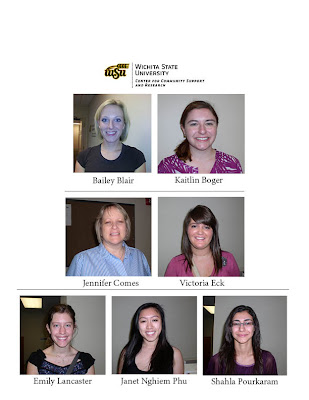Four students are from the Emory Lindquist Honors Program:
 |
| Victoria Eck at her desk |
- Victoria Eck, a junior majoring in Pre-law and Political Science/History, researched sources of resilience to help in building a model of trauma healing for CCSR’s work on Trauma-Informed Care.
- Emily Lancaster, a sophomore majoring in pre-medicine, created a logo and handouts to help people with mental illness keep track of their medical information so they can advocate for their own medical treatment.
- Janet Nghiem Phy, a freshman with an undeclared major, assisted leadership evaluation activities and reviewed literature related to leadership development and leadership programs.
- Shahla Pourkaram, a junior majoring in Aerospace and Mechanical Engineering and Pre-medicine, made phone calls for a survey for the Kansas Department on Aging and conducted a phone survey of daycare providers for the Riley County Early Head Start program.
Three graduate students are expanding their career opportunities at CCSR:
- Kaitlin Boger is a second year Master’s Social Work student who designed and facilitated leadership development sessions, supported a trauma-informed organizational process for a community partner in Topeka, and researched trauma-informed care models.
- Jennifer Comes is in her first year of the MSW program, contributing to CCSR’s mental health consumer initiative by creating a media kit for Self-Help Group services and writing the history of consumer run organizations in Kansas.
- Bailey Blair has earned a bachelor’s degree in Psychology and a Teacher’s License in English Literature and Psychology. She plans to pursue a Master’s of Social Work. Bailey is preparing a proposal to create a comprehensive network of care for transition age youth.
Based in downtown Wichita, WSU Center for Community Support and Research is proud to be a place where WSU students can immerse themselves in learning about and serving the nonprofit and public sectors while building their professional contacts and career opportunities.




